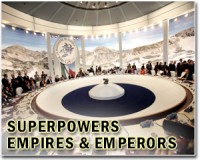| . |  |
. |
Melbourne (AFP) Nov 7, 2010 The US military plans to bolster its presence across Asia and is looking at an expansion of ties with Australia's armed forces, Defence Secretary Robert Gates said. Building up defence cooperation with Australia would reinforce a broader effort to extend the US military's role across the Asia-Pacific region, Gates told reporters aboard his plane Saturday, before landing in Melbourne. "We're looking at ways to strengthen and perhaps make more robust our presence in Asia," Gates said, referring to a Pentagon review of how American forces are deployed around the world. "We're looking at a number of different options, one of those includes talking with the Australians about... areas where we can work together in a mutually beneficial way," he said. At an annual Australia-US meeting in Melbourne, Gates said the two governments would discuss deepening military ties including cooperation on cyber security, missile defence and "space surveillance." But he said there were no plans for new US bases in Australia or elsewhere in the region. The discussions in Australia come amid concern over China's increasingly assertive stance in the Pacific and its growing naval power, with some Asian states turning to Washington for support. China's role was expected to feature high on the agenda at Monday's talks and the allies hoped China could be a "force for good" in the world, Australian Prime Minister Julia Gillard said Sunday. "I think we will be talking about the geopolitics of our region, and that means of course we'll be talking about the rise of China and as China rises, what sort of force it is going to be in the world," Gillard told commercial television. "I believe we have a shared perspective with the United States that we want China to be a force for good, strongly engaged in global and regional architecture, strongly engaged in a rules-based framework." Australian Defence Minister Stephen Smith said China's rise had been much quicker and stronger than anticipated and stressed that it needed to be open about its objectives as it "eclipsed" the military might of the US. "We have made the point to China, both privately and publicly, that there does need to be transparency about China's military strategy," Smith told ABC television. "Australia believes that China will emerge as, to use the Chinese phrase, into a harmonious environment. It will be a responsible international stakeholder. And that's what we want to see," he added. But Gates insisted US plans in the region were not designed as a counterweight to China. "This isn't about China at all," he said. The United States had an interest in building military ties with Asian countries to combat piracy at sea, bolster counter-terrorism efforts and provide humanitarian relief for natural disasters, he said. The Pentagon chief added that cooperation on humanitarian operations had come up in talks with China's military as well. His comments came as US military leaders consider moving more forces to Southeast Asia and the Indian Ocean, home to vital shipping lanes, and beyond the longstanding American presence in South Korea and Japan. A senior defence official said the Pentagon is "looking at how we can make sure our forces are not just oriented in Northeast Asia, but are looking through down to Southeast Asia and then into the Indian Ocean as this part of the security environment becomes more important." Boosting US access to Australian bases, if agreed, would likely mean a larger American presence but precise numbers remained unclear, said the official, who spoke on condition of anonymity. During the summit, defence chiefs are due to sign an agreement to bolster joint efforts to track objects in space over the southern hemisphere, including satellites, space junk and potential ballistic missiles fired from North Korea, officials said. The "space situational awareness partnership agreement" could allow for an expanded American role at the Harold E. Holt Naval Communication Station in Western Australia, which the US military already uses. Australia's military alliance with the United States has deep roots and the country remains a top buyer of American weaponry, with US military sales to Australia reaching 1.45 billion dollars in 2010.
Share This Article With Planet Earth
Related Links Learn about the Superpowers of the 21st Century at SpaceWar.com Learn about nuclear weapons doctrine and defense at SpaceWar.com
 US senator sees 'confrontation' with China, war with Iran
US senator sees 'confrontation' with China, war with IranHalifax, Canada (AFP) Nov 6, 2010 The United States faces a possible war with Iran to curb its nuclear ambitions and a "period of confrontation" with China over its currency, a top US lawmaker warned Saturday. Republican Senator Lindsey Graham said his fellow conservative, fresh from their historic elections romp this week, support "bold" action to deal with Iran. If President Barack Obama "decides to be tough with Iran ... read more |
|
| The content herein, unless otherwise known to be public domain, are Copyright 1995-2010 - SpaceDaily. AFP and UPI Wire Stories are copyright Agence France-Presse and United Press International. ESA Portal Reports are copyright European Space Agency. All NASA sourced material is public domain. Additional copyrights may apply in whole or part to other bona fide parties. Advertising does not imply endorsement,agreement or approval of any opinions, statements or information provided by SpaceDaily on any Web page published or hosted by SpaceDaily. Privacy Statement |